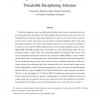Free Online Productivity Tools
i2Speak
i2Symbol
i2OCR
iTex2Img
iWeb2Print
iWeb2Shot
i2Type
iPdf2Split
iPdf2Merge
i2Bopomofo
i2Arabic
i2Style
i2Image
i2PDF
iLatex2Rtf
Sci2ools
TC
2010
2010
Reconfigurable Hardware Implementations of Tweakable Enciphering Schemes
Tweakable enciphering schemes are length preserving block cipher modes of operation that provide a strong pseudo-random permutation. It has been suggested that these schemes can be used as the main building blocks for achieving in-place disk encryption. In the past few years there has been an intense research activity towards constructing secure and efficient tweakable enciphering schemes. But, actual experimental performance data of these newly proposed schemes are yet to be reported. Accordingly, in this paper we present optimized FPGA implementations of five tweakable enciphering schemes, namely, HCH, HCTR, XCB, EME and TET, using a 128-bit AES core as the underlying block cipher. We report performance timings of these modes when using both, pipelined and sequential AES structures. The universal polynomial hash function included in the specification of HCH, HCHfp (a variant of HCH), HCTR, XCB and TET, was implemented using a Karatsuba-Ofman multiplier as the main building block. We...
AES Core | Information Technology | Main Building Block | Software Engineering | TC 2010 | Tweakable Enciphering Schemes |
| Added | 21 May 2011 |
| Updated | 21 May 2011 |
| Type | Journal |
| Year | 2010 |
| Where | TC |
| Authors | Cuauhtemoc Mancillas-López, Debrup Chakraborty, Francisco Rodríguez-Henríquez |
Comments (0)

